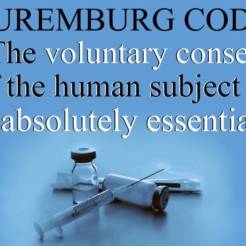Introduction: Unethical Medical Experiments 1980–2010
“The whole discipline of biomedical ethics rises from the ashes of the Holocaust…” Arthur Caplan
The Nuremberg Code (1947) laid the foundation for biomedical ethics mandating that medical experiments conducted on human beings must conform to well-defined humane, ethical standards; foremost is immutable standard:
“The voluntary consent of the human subject is absolutely essential.
The information sought is “unprocurable by other methods or means of study;
the anticipated results will justify the performance of the experiment;
the experiment is designed “to avoid all unnecessary physical and mental suffering or injury;
risks to subjects be minimized to protect against “even remote possibilities of injury, disability or death.”
The Nuremberg Code makes clear that ethical standards protecting individual human rights supersede arguments invoking the “greater good of society.”
The Declaration of Helsinki (1964) expanded on a requirement of full disclosure:
“In medical research involving competent human subjects, each potential subject must be adequately informed of the aims, methods, sources of funding, any possible conflicts of interest, institutional affiliations of the researcher, the anticipated benefits and potential risks of the study and the discomfort it may entail, and any other relevant aspects of the study.
“In any medical study, every patient – including those of a control group, if any – should be assured of the best proven diagnostic and therapeutic method.” (World Medical Association, 1964, 1996 2000)
Thirty years after the Nuremberg Code, the United States was confronted with the infamous Tuskegee Syphilis experiment which resulted in the government forging ethical research principles. The Belmont Report (1978, 1979) provided the template for the Code of Federal Regulations (45 CFR 46) followed by The Common Rule.
The overwhelming evidence that these ethical principles were much more frequently honored in their breach than in their observance. The record is clear: dubious medical experiments that failed to meet medical ethical standards have been — and are currently — approved not only by commercial corporate entities, but by academic and government review boards and institutions whose mandate is to ensure that the safety and rights of human subjects are protected.
Conflicts of interest, rather than ideologies have derailed medicine from its ethical tradition. The entire field of medical research is now permeated by conflicts of interest. All major academic institutions government agencies, including the National Institutes of Health, the Food and Drug Administration, the Center for Disease Control, the Environmental Protection Agency, are dependent upon major corporate money. Thus business ethics has usurped medical ethics. Read Doing Harm to the Most Vulnerable; Read NIH Under Fire; Read Research Center Tied to Drug Company; Read CDC Covertly Tested Experimental Vaccine on Black/Latino Babies.
The only redress and reliable source of information comes from litigation when primary secret documents are uncovered during the discovery process. Read more here and here. Finally, unless they are stopped, Medical Research Stakeholders Seek to Overturn Informed Consent.

